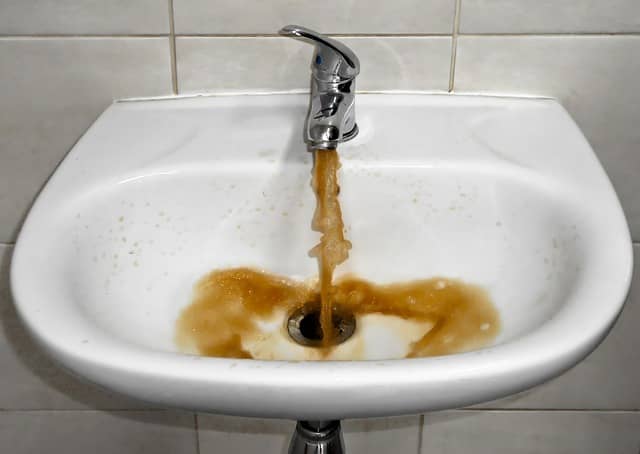Picture the scene: you go to get yourself a nice refreshing glass of water but, as you turn the handle you’re confronted not with a pure, crystal clear stream but instead find rusty, brown water coming out of your faucet.
You’ll likely find yourself asking a few questions when confronted by a muddy stream coming from the tap; what’s caused this to happen? Can I still drink this? Is this a health risk? Perhaps most pressing of all these questions is:
What’s going on?
What Causes Brown Water?
The water we see in our homes most often is crystal clear. It’s one of those little features of modern living that has crossed from luxury to absolute bear necessity so when you find your tap water is brownish, it’s only natural that you’ll wonder what is going on.
Brown water in your house could come from a number of sources:
- Rust and corrosion in old pipes
- Sediment build-up in the water supply
- Disturbance of sediment in the water main during maintenance
Whatever the cause, brown water coming from your faucet suggests that there is contamination coming from somewhere.
It’s also worth noting here that “brown” is a pretty wide spectrum and could be caused by all kinds of contamination. From redish-rusty brown to muddy or even sewage colour, brown water ranges from the unpleasant to the downright gross.
Is Brown Water Safe to Drink?
The next question you’re likely to ask yourself is “can I still drink this?”
While there’s a chance that it’s fine and boiling it will certainly make it safer than drinking brown water straight from the faucet, it is definitely not a risk worth taking without expert advice saying that it’s alright in your particular situation.
It’s always better to be safe than sorry.
To elaborate: it depends on exactly why the water in your house is brown. A little rust probably won’t harm you (though it probably won’t taste very nice), but if the source of contamination has come from a broken pipe, you can never be sure what has caused the problem. It could be mud, sediment or something far less pleasant.
Until you have answers as to what might have caused the issue, it’s best to err on the side of caution and avoid drinking brown water.
Drinking unclean water can lead to some really serious health problems, not least of all some pretty unpleasant gastric issues, so it’s best to find an alternative water supply.
Even imbibing water that’s too rich in iron (i.e rusty coloured water) over an extended period can lead to kidney problems down the line, even if it won’t harm you in the short term.
Steps to Take When You Find Brown Water Coming Out Of Your Faucet
When you find brown water coming from your faucet there are steps you can take, both immediately, on your own and, if they don’t solve the issue, with the help of a professional.
Immediate actions
As soon as you notice brown water in your house you should undertake the following actions. These may sort the problem without any further fuss and even if they don’t they’ll give you valuable information which can help with the fix:
Run The Water
Don’t be tempted to turn the faucet off- let it run. There’s a chance, especially if the faucet hasn’t been in use or work has recently been done on your plumbing or the municipal supply that flushing out the pipes will clear the problem.
You should leave the water running for several minutes and see if the problem gets better. Sometimes this is enough to return your water to a drinkable state and it’s by far the simplest solution, so it’s worth ticking it off the list first.
Avoid Using Hot Water
When you discover brown water coming from your faucet, turn off the hot water and avoid using it until the problem is solved. This is doubly true if you discovered rusty water coming from the hot supply, but even if the water was cold, avoid using the hot until the problem is rectified.
Rusty water may be a sign that your water heater is on the way out but even if it doesn’t turn out to be a rusty tank, cycling brown water into your hot water system is to be avoided where possible as you’ll find it harder to flush from there than the cold water supply.
It’s also best to avoid using the hot water if you suspect the contamination has entered from the water-main. Many bacteria thrive in warm water, so if there’s a chance they’ve gotten into your supply, it’s best to avoid letting them spread into your tanks.
Contact Your Supplier
Your next point of call should be to report the issue to your local water utility or municipality. They may know what is going on and, if it’s at their end, they need to know about the problem to start fixing it.
Often, discolored water is caused by routine maintenance on the supply end. Usually they’d warn people in advance, but there’s a chance you’ve missed the message or they’ve simply forgotten to send it.
Not only will you be doing your civic duty by reporting the issue, they’ll also be able to offer you advice and maybe even supply you with bottled water until the problem is sorted properly if it’s caused by something on their end.
Test Water Quality
Buying and using a water testing kit (if you keep fish, you’ll be familiar with these) can let you know what exactly is contaminating your water supply and turning it brown. This information can help you narrow down the cause and make a plumber’s job easier.
A dip-stick kit is the easiest to use and can reveal all kinds of interesting information about what’s in your water supply. Simply fill a glass with the water in question, dip the stick in and compare it to the chart to find out what impurities there are in your water.
Contact a Plumber
If the problem doesn’t seem to be down to your supplier, it’s time to get a plumber in to inspect your system and, hopefully, find the issue and sort it.
Professional Assistance
If flushing the system hasn’t helped and the local water utility are denying all knowledge, it’s time to call in the pros.
A professional plumber can help you when you find brown water coming from your faucet in the following ways:
Flushing and Cleaning Your System
Sometimes simply running the tap won’t be enough to clear out the cause of the problem and you’ll need a full cleaning. Professional plumbers will have the kit and knowledge to make this a straightforward task, saving you the hassle of having to do it yourself.
Installing filtration and purifiers
Not only will installing a purifier solve your immediate problem, it should, in theory, stop it from ever being a problem again. Having your plumber install a filtration system should remove any contaminates before you find brown water in your sink.
Preventing Brown Water In The Future
Of course, now that you’ve sorted the immediate issue of turning on the faucet and being met with an unpleasant stream of brownish water, you’ll want to avoid it happening again in the future.
While there’s no fool proof way to avoid brown water in your house, there are steps that you can take to reduce the likelihood of encountering it again.
Regular Maintenance: Keeping on top of the maintenance routine is the key way to avoid brown water. Regularly flush your pipes by running the faucets, clean your water heater annually and generally ensure that everything is kept in good working order.
Monitor Your Water Quality: While it may seem a touch obsessive, regularly monitoring the quality of the water coming out of your faucet can give you the jump on issues before they become a problem. Water testing kits are cheap and easy to use too.
Keep Informed: follow your local water utility or municipality on social media. This is where they’re most likely to post notices of works or warning about contaminations first, meaning you’re ahead of the game.
Brown water coming from the faucet is a problem that no one wants to face (especially when you really wanted that refreshing drink) but it’s usually a temporary issue and with a little knowledge and help, it’s easily fixed.

